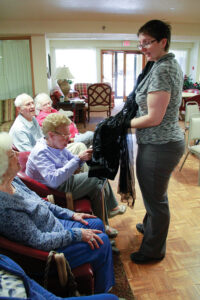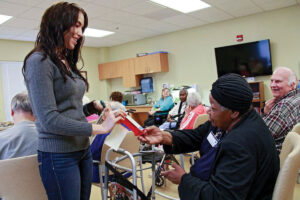By Meredith Bollinger

History is important. Through time it has taught us lessons and embedded momentous occasions deep within our memories. However, we still take for granted what the past means to us through our local or personal histories. Generally speaking, we can remember what toys we used to play with, what clothes we used to wear, as well as the places we may have visited on a regular basis. But what about those who can no longer recall such things?
Those affected by Alzheimer’s deal with holes in their memories, struggling to piece fragments together to form a complete image or thought. When the sight of a family member was once enough to bring them back, it is now another face among strangers.
So what do we do? We campaign; we get together to fundraise further research in hope of finding a cure. Even so, these actions focus only on the hope to aid future victims while ignoring those dealing with Alzheimer’s today.
Several institutions, such as nursing homes and assisted living centers, have specialized in patients suffering with varying forms of dementia, providing them with an enriching environment and specific programs that exercise their cognitive abilities. However, one institution has found a unique way to engage these seniors.

The McLean County Museum of History offers its Senior Reminiscence Program as a tool to use their historical artifacts to improve the lives of seniors who struggle with dementia. This free program uses historical objects and photographs to engage and provide intellectual stimulation for those suffering from memory loss. It grants participants an opportunity to recover fragments of their past lives in and outside McLean County, as well as share these invaluable recollections with interested parties.
Although there are art museums located in Chicago that have programs for seniors with dementia and cognitive disorders, the McLean County Museum of History’s program differs. Museum Director of Education Candace Summers says, “we feel our program is unique in that we utilize cultural artifacts and photographs, from throughout our local history, to stimulate the memories of program participants and encourage them to share those memories with each other during these sessions.”
Recognizing the need for the inclusion and care of one of the largest and most under-served populations in the country, the museum regularly travels throughout central Illinois serving over 1,000 seniors each year. Since its start in 2005, nearly 460 Senior Reminiscence programs have been presented. Those with dementia and other cognitive disorders struggle to access their short term memory, however the program targets the long-term memory through older artifacts specific to the participant’s region. Providing seniors with the tools to help them remember the people they used to be can greatly benefit them as human beings today.
Activity directors from two senior care centers in Bloomington, Ill., gave insight into what it was like to witness their residents during the program. They were impressed with how using the objects, and allowing the residents to hold and manipulate them, triggered vivid personal stories. They could see the resident’s eyes light up with happiness while watching the presentation and listening to the stories, and could tell they were reminiscing about their past/childhood and were enjoying it.

There are five workshops currently offered: Play it Again: The Toys and Games We Remember, Tools of the Trade, Well-Dressed Folks About Town, Photo Reminiscence, and What’s Cooking? Gadgets from Around the Kitchen. These hour-long programs feature items utilizing a specific theme, whether it’s tools that older farmers remember using, or perhaps remember their fathers using, or appliances from the kitchen and household.
The program offers its participants such an engaging and culturally rich experience that more often than not, it brings them back to reality. For those fleeting moments they are recalling fond memories, and perhaps smiling at their youth, as they flash before their eyes. The games they played and the people they played with come flooding back. Participants light up at the euphoric sensation the program brings to them as it reintroduces these men and women to who they are, by examining who they used to be.
Summers fondly recalls a moment after presenting a program at the Martin Health Center in Bloomington. After the program ended, one participant approached her as she was packing up. Taking Summers’ hand in hers, she said, “Honey, you bring us back to reality, even if it is only for a little while.”
“It was the most touching experience of my career at that point,” recalls Summers, “and one that still brings me to tears, even to this day.”
Summers and her co-workers in the education department do a phenomenal job connecting with the participants, helping them remember different parts of their lives as well as how their history can also contribute to the community.
Unfortunately, the museum cannot travel all over the state to present this insightful program, but through a how-to workshop (held at the museum on March 22 of this year), other institutions may be able to create reminiscence programs of their own.
“We know there is a need and desire for this type of program in other parts of our state,” says Summers. “It is our hope, through the workshop we have created, to teach professionals from other historical sites, museums, cultural institutions, and senior care organizations in Illinois, how to create their own programs.”
It is the hope of McLean County Museum of History, that through these visits and educational efforts, the program will reach far beyond McLean County, bringing respect and care back to some of our most essential, and more commonly neglected, citizens.








